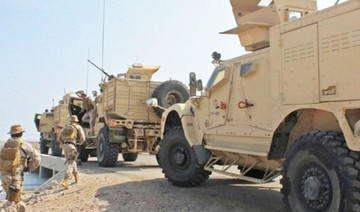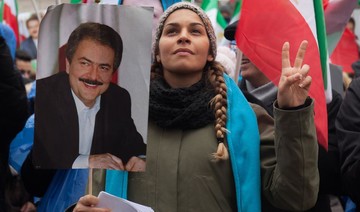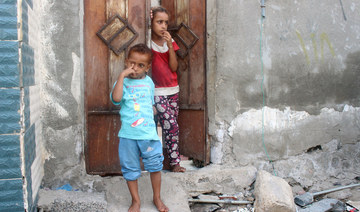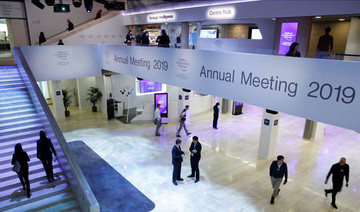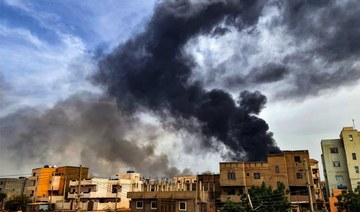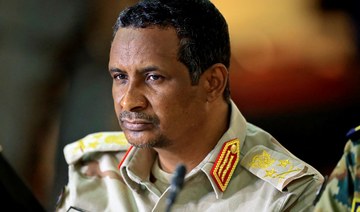DUBAI: Inspired in part by Iran’s Islamic Revolution, a young Egyptian army lieutenant emptied his machine gun into President Anwar Sadat in 1981, killing a leader who made peace with Israel and offered the shah a refuge after his overthrow.
The assassination carried out by Khalid Al-Islambouli and others from a Sunni Islamic extremist group showed the power of Iran’s Shiite-led revolution across the religious divides of the Muslim world.
Islamists initially saw Iran’s revolution as the start of an effort to push out the strongman Arab nationalism that had taken hold across the Middle East.
But those divisions now feel inflamed by the sectarian bloodshed that followed the US invasion of Iraq in 2003, Syria’s long civil war and the regional rivalry between Iran and Saudi Arabia.
It may seem as though the Middle East has always been divided between Sunni Islam, which represents about 85 percent of the world’s more than 1.8 billion Muslims, and Shiite Islam. But that divide, stemming from a disagreement centuries ago over who should succeed the Prophet Muhammad, owes much to the political rivalry between Saudi Arabia and Iran after 1979.
Long before the Islamic Revolution, Islamists had wanted to wed governments to their faith. One of the most prominent was the Muslim Brotherhood, a Sunni group founded in 1928 in Egypt that spread across the Arab world. Another was the Iranian Shiite Islamist group “Devotees of Islam,” who assassinated pro-Western Prime Minister Ali Razmara in 1951.
The aftermath of World War II instead saw the rise of pan-Arab nationalists, chief among them Egypt’s Gamal Abdel Nasser. Military strongmen took power, pushing for rapid modernization that shunted religion aside.
The nationalists “see themselves often as critical of religion because religion is ‘backward.’ It’s what’s been holding the Arab world back,” said Daniel Byman, a senior fellow at the Brookings Institution and a professor at Georgetown University. “That’s kind of the dominant divide, and Islamists of all stripes are pushing back against this.”
Ayatollah Ruhollah Khomeini, who returned to Iran from exile after the departure of Shah Mohammad Reza Pahlavi, made a point to keep Shiite ideas out of speeches.
“The Iranian revolution in the beginning was portraying itself as the start of a pan-Islamic revolution,” said Toby Matthiesen, a senior researcher at St. Anthony’s College at the University of Oxford who is writing a book on Sunni-Shiite relations. “It was even seen like that by a lot of the Sunni Islamic movements.”
Khomeini also made a point to embrace the Palestinians in their fight against Israel. Yasser Arafat, the leader of the overwhelmingly Sunni Palestinians, returned the favor by becoming the first leader to visit Khomeini.
“The Iranian revolution gave us a strong belief that the tyrants can be brought down,” said Ahmed Yousef, one of the founders of Hamas, the Palestinian Islamic political party and armed wing that has controlled the Gaza Strip since 2007 with Iran’s backing. “Following that big victory, the Islamic Jihad was established here in Palestine and few years later Hamas was founded too.”
The pan-Islamic Iranian inspiration perhaps reached its height on Oct. 6, 1981, as Islambouli and his co-conspirators rushed out of a truck at a Cairo military parade and assassinated Sadat, who had made history by signing the first Arab peace deal with Israel. At trial, Islambouli famously clutched a Qur’an and shouted: “It was I who killed the Pharaoh!” Iran venerated Islambouli, naming a street in Tehran after him and issuing a postage stamp in his honor.
But by this time, Saudi Arabia, fearful of Iran’s growing influence and the 1979 extremist attack on the Grand Mosque at Makkah, began pumping money into spreading its ultraconservative view of Sunni Islam throughout the world and dismissing Shiites as apostates.
“The Saudis really put a lot of money into the ‘Dawah’ machine to try to out-compete Iran around the world,” Byman said, referring to the kingdom’s proselytizing efforts. “There’s a real panic and concern then.”
Pan-Islamic admiration for Iran waned as it supported destabilizing attacks across the region, such as a failed 1981 militant coup in Bahrain and a 1985 car bombing targeting the emir of Kuwait. Iran’s eight-year war with Iraq deepened that rift.
Iran at the same time found perhaps its greatest success in helping create the Shiite militant group Hezbollah in Lebanon, which still holds sway over much of the country decades later as both an armed group and a political party. In October 1983, a bombing at the US Marine barracks in Beirut killed 231 American troops — the bloodiest day for the armed forces since World War II — and a US federal judge blamed Hezbollah and Iran for the attack. Iran has long denied any involvement.
Sectarianism exploded in the region with the US invasion of Iraq in 2003. Iran backed Shiite militants implicated in deadly roadside bomb attacks against US forces and sectarian assaults on Sunnis. Sunni extremists repeatedly targeted Shiite civilians, and when the Daesh group rampaged across Syria and Iraq in 2014 it massacred Shiites and other minorities. Iran intervened again, reactivating the militias to help Iraqi forces eventually defeat the extremist group.
Syria’s civil war further fueled the split, as Iran and Hezbollah provided crucial military aid to President Bashar Assad, who comes from the Alawite religious minority, while Sunni Gulf countries and Turkey supported the mainly Sunni opposition.
And yet even today, the role of the Iranian revolution in stoking Sunni militancy cannot be ignored.
“The Iranian revolution played a significant role in the birth and the growth of the jihadist movements in the Arab World, as it raised the awareness of the role of religion in political change in the region,” said Adnan Milhem, a Palestinian historian at Al-Najah University. “The Iranian revolution affected the political thinking in the region in terms of introducing religion as a changing tool to fight oppression and corruption.”
Iran’s Islamic Revolution inspired, divided militants
Iran’s Islamic Revolution inspired, divided militants
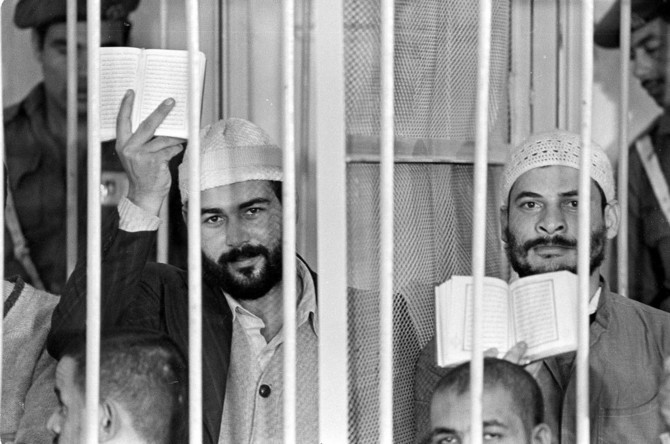
- Inspired in part by Iran’s Islamic Revolution, a young Egyptian army lieutenant emptied his machine gun into President Anwar Sadat in 1981
- Islamists initially saw Iran’s revolution as the start of an effort to push out the strongman Arab nationalism that had taken hold across the Middle East
Leaders of Jordan and Pakistan call UAE president to express concern about effects of severe storm

- Leaders passed on their best wishes to the country as it recovers from the storms
DUBAI: The president of the UAE, Sheikh Mohammed bin Zayed Al-Nahyan, received telephone calls from King Abdullah of Jordan and Pakistan’s Prime Minister Shehbaz Sharif on Friday, during which they expressed concern about the effects of the severe weather, including unusually heavy rainfall, that battered parts of the country this week.
They also passed on their best wishes to the country as it recovers from the storms and “conveyed their heartfelt hopes for the safety and prosperity of the UAE and its people, praying for their protection from any harm,” the Emirates News Agency reported.
Sheikh Mohammed thanked both leaders for their warm sentiments, and emphasized the strong bonds between the UAE and their nations.
The UAE and neighboring Oman were hit by unprecedented rainfall and flooding on Tuesday, with more than 250 millimeters of rain falling in parts of the Emirates, considerably more than is normally seen in a year. Dubai International Airport was forced to close temporarily when runways were flooded.
Peshmerga fighter dies in Turkish strike in north Iraq

JEDDAH: A member of the Kurdish Peshmerga security forces was killed on Friday in a Turkish drone strike in the autonomous Kurdistan region of northern Iraq.
Ankara regularly carries out ground and air operations in the region against positions of the outlawed PKK, the Kurdish separatist group that has waged a decades-long insurgency against the Turkish state.
The victim of Friday’s attack died in a drone strike on his vehicle, said Ihsan Chalabi, mayor of the mountainous Sidakan district near Iraq’s borders with Turkiye and Iran.
For decades, Turkiye has operated several dozen military bases in northern Iraq in its war against the PKK, which Ankara and its Western allies consider a terrorist group.
Both Baghdad and the Kurdish regional government have been accused of tolerating Turkiye’s military activities to preserve their close economic ties.
At the beginning of April, a man described as “high-ranking military official” from the PKK was killed in a Turkish drone strike on a car in the mountainous Sinjar region, according to the Kurdistan counterterrorism services.
Turkish President Recep Tayyip Erdogan is expected to visit Baghdad on Monday on his first official visit to Iraq since 2011.
Iraq’s Defense Minister Thabet Al-Abassi in March ruled out joint military operations against the PKK, but said that Turkiye and Iraq would “work to set up a joint intelligence coordination center.”
Middle East in ‘shadow of uncertainty due to regional conflicts’

WASHINGTON: Economies in the Middle East and North Africa face a “shadow of uncertainty” from ongoing tensions in the region, a senior IMF official said.
“We are in a context where the overall outlook is cast into shadows,” Jihad Azour, the International Monetary Fund’s director for the Middle East and Central Asia department, said in an interview in Washington.
“The shadow of uncertainty on the geopolitical side is an important one,” added Azour, a recent candidate for the next Lebanese president.
In the face of the ongoing conflicts in Gaza and Sudan and a recent cut to oil supplies by Gulf countries, the IMF has pared back its growth outlook for the Middle East and North Africa region once again.
FASTFACT
Economic activity in Gaza has ‘come to a standstill’ and the IMF estimates that economic output in the West Bank and Gaza contracted by six percent last year.
The IMF expects growth in MENA of 2.7 percent this year — 0.2 percentage points below its January forecast — before picking up again next year, the IMF said in its regional economic outlook report.
The risks to growth in the MENA region remain heightened, the IMF said, pointing to the danger of greater regional spillovers from the ongoing Israel-Gaza war.
“We have concerns about the immediate and lasting impact of conflict,” Azour said.
The IMF report said that economic activity in Gaza has “come to a standstill” and estimates that economic output in the West Bank and Gaza contracted by 6 percent last year.
The IMF said the report excludes economic projections for the West Bank and Gaza for the next five years “on account of the unusually high degree of uncertainty.”
The IMF cannot lend to the West Bank and Gaza because they are not IMF member countries.
However, Azour said it has provided the Palestinian Authority and the central bank with technical assistance during the current conflict.
“When we move into the reconstruction phase, we will be part of the international community support to the region,” he added.
Azour also discussed the situation in Sudan, where thousands have been killed in a civil war that has also devastated the economy, causing it to contract by almost 20 percent last year, according to the IMF.
“The country is barely functioning, institutions have been dismantled,” he said.
“And for an economy, for a country like Sudan, with all this potential, it’s important to stop the bleeding very quickly and move to a phase of reconstruction,” he added.
The recent Houthi attacks have particularly badly hit the Egyptian economy on Red Sea shipping, which caused trade through the Egypt-run Suez Canal to more than halve — depriving the country of a key source of foreign exchange.
Egypt reached an agreement last month to increase an existing IMF loan package from $3 billion to $8 billion after its central bank hiked interest rates and allowed the pound to plunge by nearly 40 percent.
A key pillar of the current IMF program is the privatization of Egypt’s state-owned enterprises, many of which are owned by or linked to the military.
“This is a priority for Egypt,” Azour said. Egypt needs to have a growing private sector and give space for the private sector to create more jobs.”
“We have an opportunity to re-engineer the state’s role, to give the state more responsibility as an enabler and less as a competitor,” he said.
Oxfam director urges global support for refugees in Jordan
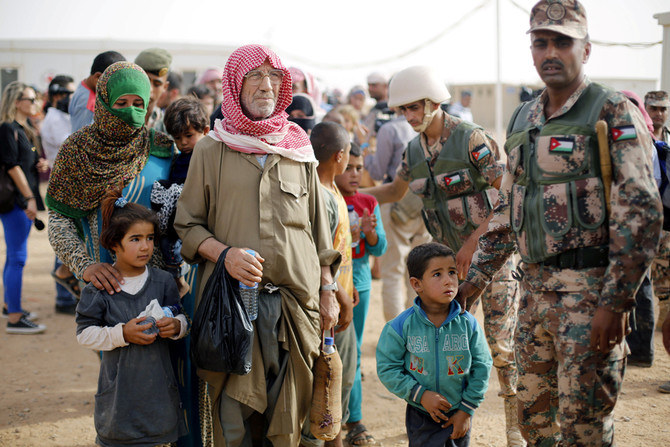
- Dmitry Medlev speaks of impact of over 3m people from neighboring areas
LONDON: Oxfam’s country director in Jordan said on Friday the global community had a responsibility to support refugees, especially in light of unrest in the Middle East.
In an interview with the Jordan News Agency, Dmitry Medlev described how an influx of over 3 million refugees from neighboring areas had stretched Jordan’s economic resources, disrupted local communities, and burdened public services.
He described the refugee’s experience as harrowing, often involving the painful process of abandoning the individual’s homeland and everything they held dear.
He said: “We are sending a message to the world not to overlook the refugee problem and to keep its focus on the new global disasters created by humans or caused by natural disasters, and the conflicts that have emerged in several countries recently, because the refugee problem is draining host countries and imposing additional burdens on them that they may not be able to bear in the future.”
Medlev called for enhanced international cooperation and adherence to international humanitarian law in supporting refugees, underscoring the need for long-term solutions to the ongoing crisis.
He also spoke of Oxfam’s initiatives in Jordan, such as the Waste to Positive Energy project in partnership with the Federal Ministry of Economic Cooperation and Development, and the EU, and executed with the German Corporation for International Cooperation. The project focuses on waste management and recycling in Zaatari Camp and Mafraq Governorate, processing about 30 tonnes of waste per day.
Medlev also pointed out Oxfam’s efforts in promoting economic and climate justice through grants aimed at empowering local projects led by women and youngsters. These grants help enhance project efficiency, ensure sustainability, and connect beneficiaries with supportive institutions.
He outlined Oxfam’s five-year strategy in Jordan, which focuses on gender justice, climate justice, and economic justice, and aims to bolster the country’s preparedness for disasters, enhance employment opportunities, and provide humanitarian support for refugees.
Jordan’s King Abdullah II told the UN General Assembly in September that the world must not abandon Palestinian refugees to the forces of despair.
Sudanese rue shattered dreams as war enters second year
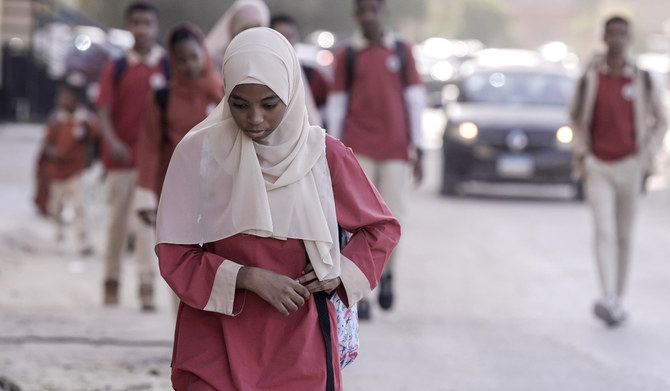
- Bashir’s ouster in April 2019 ushered in a civilian-led transition that saw an outpouring of “hope, inspiration and vibrancy” among young Sudanese, said Samah Salman, who worked in corporate venture capital then
DUBAI: Lawyer Omar Ushari still remembers the hope that gripped Khartoum after the uprising that overthrew President Omar Bashir in 2019. Now, after a year of war between rival generals, much of the Sudanese capital lies in ruins.
The 46-year-old, then detained for his activism, celebrated behind bars when Bashir was toppled in a palace coup.
In the heady days that followed, as the army promised a transition to elective civilian rule, Ushari was released and set to work on his dream project: a literary cafe near the banks of the Nile.
Named Rateena, his cafe swiftly became known as a safe haven for young activists eager to contribute to building a “better Sudan.”
But on April 15 last year, the Sudanese army and the paramilitary Rapid Support Forces went to war, and Ushari watched both his project and his dreams for the country “fade, bit by bit.”
BACKGROUND
Omar Bashir’s ouster in April 2019 ushered in a civilian-led transition that saw an outpouring of ‘hope, inspiration and vibrancy’ among young Sudanese, says Samah Salman, who worked in corporate venture capital then.
For months, he braved raging street battles to visit Rateena, “sit in the dark, take stock of what had been looted since my last visit, and reminisce.”
He did not understand how “the music that filled the space, the lectures and debates people shared, had been replaced with stray bullets strewn around me and the sound of tank fire outside.”
Now, as the war has entered its second year, with thousands dead and millions more driven from their homes, Ushari says he is “only one of the thousands of dreams shattered” — a microcosm of “a stolen revolution.”
Bashir’s ouster in April 2019 ushered in a civilian-led transition that saw an outpouring of “hope, inspiration and vibrancy” among young Sudanese, said Samah Salman, who worked in corporate venture capital then.
Startups were “springing up all across Sudan,” she said from the US, “all building extraordinary solutions to real needs ordinary Sudanese people were facing.”
Salman reviewed over 50 startups in telehealth, agritech, renewable energy, logistics, and fintech solutions, crediting the boom to “the energy of the revolution.”
According to Ushari, “hopes were high that Sudan was finally on the right path, out of the shadows and heading toward democracy, toward freedom.”
Like countless others, communications expert Raghdan Orsud, 36, wanted to play her part.
She co-founded Beam Reports to investigate disinformation in Sudan — “out of the belief in the role media can play in democratic transition,” she said from London.
But that transition ended in October 2021, two months after Beam Reports launched.
The same generals who would later go to war — army chief Gen. Abdel Fattah Al-Burhan and his then-deputy RSF commander Gen. Mohammed Hamdan Dagalo — ousted civilians from the transitional administration.
“Nothing was the same after the coup,” Ushari said.
“It was a painful time. They were killing protesters every week, but still, we had hope.”
Then, one fateful Saturday at the end of Ramadan, the people of Khartoum awoke to the sounds of air strikes and shelling as their worst fears came true: the erstwhile allies had turned their guns on each other.
Bodies began piling up on the streets as vicious urban warfare drove millions to flee.
Orsud had just bought studio-grade recording equipment, “still in their boxes,” when RSF paramilitaries seized and looted her offices.
Ushari was piecing together a life in Cairo when he received a video message showing a massive fire.
“That’s how I found out Rateena had burned down,” he said.
Countless Sudanese in the diaspora — who had spent decades saving up to build their Khartoum homes — have been forced to watch from afar as the RSF looted them.
“At some point, he was praying for an airstrike to hit the house,” pastry chef Shaimaa Adlan, 29, said in Cairo, referring to her father in Saudi Arabia.
“He would have rather seen it destroyed than know his life’s work was being used as a paramilitary base.”
Adlan had started a catering business in Khartoum before finding herself in Egypt — uprooted and jobless.
But barely a year later, she sprints through a bustling kitchen in Cairo, shouting orders to her staff and fussing over dishes.
Back home, Salman says the war has not crushed Sudanese entrepreneurialism, just redirected it.
She said tech entrepreneurs now crowdsource real-time safety updates instead of protest plans and optimize evacuation paths instead of delivery routes.
The same young people organizing demonstrations now coordinate aid, becoming what the UN calls “the front line” of humanitarian response.
And in displacement centers and the diaspora, the dream of a new Sudan has not been forgotten.
“No matter where we’ve been exiled or what remote Sudanese state we’ve ended up in, there’s still a spark of the revolution left in every heart,” Ushari said.
“Sudan is ours, it’s all of ours,” said Orsud, whose fact-checking team has resumed operations from Nairobi.
“What else would we do besides rebuild it, over and over?“


